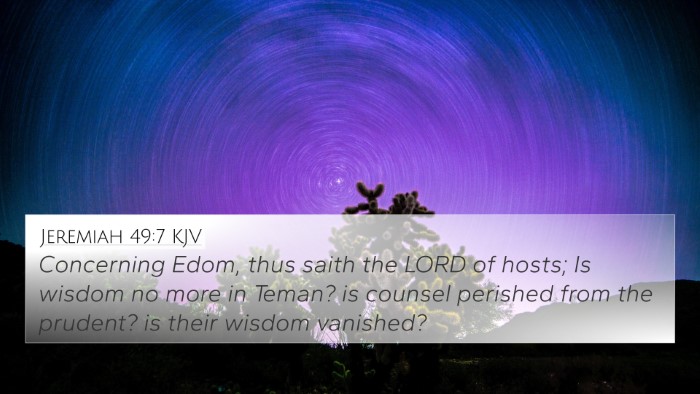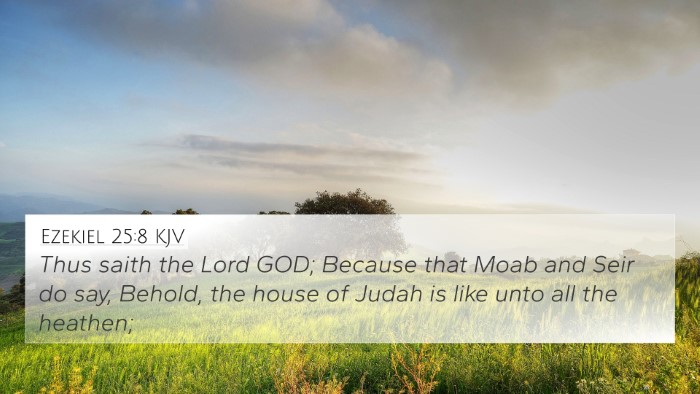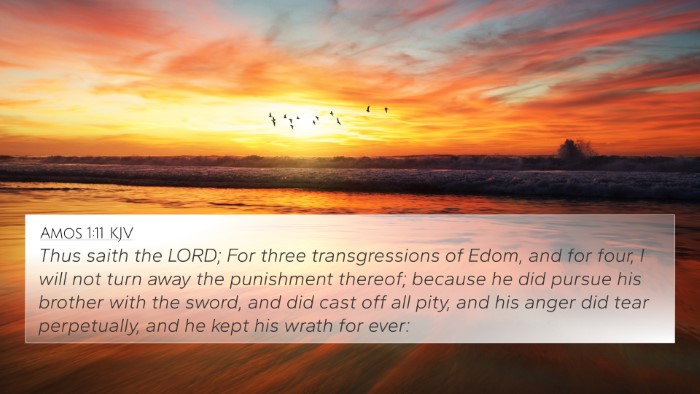Ezekiel 25:12 Explained
Bible Verse: Ezekiel 25:12 - "Thus saith the Lord God; Because that Edom hath dealt against the house of Judah by taking vengeance, and hath greatly offended, and revenged himself upon them;"
Summary of Insights
This verse speaks to the actions of Edom against Judah and highlights God's righteous judgment against the nations for their actions towards His people. The prophetic declaration through Ezekiel makes clear that God sees and remembers the injustices done by Edom, emphasizing His sovereignty and the inevitability of divine justice.
Understanding the Context
The historical backdrop of this prophecy is crucial to understanding its meaning. Edom, descended from Esau, had longstanding enmity with Israel, the descendants of Jacob. This passage reveals the animosity that Edom harbored against Judah, especially when Judah faced calamity and was weakened by foreign powers.
Key Themes
- Divine Justice: God holds nations accountable for their actions, especially in their treatment of His people.
- Revenge and Retribution: Edom took vengeance on Judah at a time of their vulnerability, prompting God's response against them.
- Covenantal Relationship: The plight of Judah reflects God's covenant with Israel and the consequences of its violation by Edom.
Connections to Other Bible Verses
To deepen our understanding of Ezekiel 25:12, we can explore the following cross-references:
- Obadiah 10-14: This passage directly addresses the pride and violence of Edom against Jacob.
- Psalm 137:7: Reflects Judah's lament regarding Edom's role during their destruction and exile.
- Isaiah 63:1-6: Speaks of God's vengeance upon Edom, paralleling His reaction noted in Ezekiel.
- Amos 1:11-12: Provides additional prophetic judgment against Edom for their violent actions.
- Lamentations 4:21: Indicates the role of Edom in the suffering of Judah during their darkest times.
- Jeremiah 49:7-22: Contains prophecies against Edom, notably its pride and the retribution that will befall them.
- Malachi 1:2-3: God contrasts His love for Jacob with His hatred for Esau, linking on a theological level to the Edomite actions.
Comparative Bible Verse Analysis
When conducting a comparative analysis of these verses, we can observe:
- The repeated theme of justice and retribution against those who oppose God's chosen people.
- How Edom's actions embody a broader narrative of nations struggling against God's plans.
- The significance of the covenant relationship that Israel has with God, emphasizing the consequences for opposing it.
Tools for Bible Cross-Referencing
To explore these connections further, one can utilize various tools and methods:
- Bible Concordance: Look up terms related to Edom and Judah for more links.
- Bible Cross-Reference Guide: Use guides that illustrate connections between verses and themes.
- Cross-Reference Bible Study: Engage in topical studies using a methodical approach to connecting scriptures.
- Online Bible Reference Resources: Utilize digital tools and apps that offer extensive cross-referencing capabilities.
Understanding Inter-Biblical Dialogue
This verse echoes the larger biblical narrative, demonstrating how God's judgment and mercy are interwoven throughout scripture. The repeated proclamations of judgment against Edom serve as a reminder of God’s overarching sovereignty and the unfolding story of redemption that relates to both the Old and New Testaments.
Conclusion
The interpretation of Ezekiel 25:12 encapsulates a moment of divine judgment, a reminder of God's justice and the seriousness with which He views the treatment of His chosen people. The thematic connections and biblical cross-references serve as a bridge to understanding not only this particular verse but also the narrative arc of the Scriptures as a whole.
Further Study Suggestions
To enhance your understanding of Ezekiel 25:12 and its implications, consider studying:
- The book of Ezekiel in its entirety for context.
- Parallel passages in the prophetic literature that address themes of justice.
- The history of Edom and Judah to grasp the implications of their relationship.










